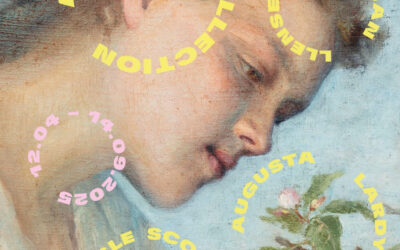Alexandra Mas: I’ve known about your passion for cinema since you were younger than the protagonists in the film. How much of Simon is reflected in Youssou and Malek?
Simon Frenay: Firstly, thank you very much for this opportunity to talk about Youssou and Malek. It makes me very happy. There is a lot of myself in the film, I suppose. I made this movie for the little Simon, the one who needed a positive representation of himself when he was a kid or a teenager. It would have helped me to accept my sexual orientation. In a way, Youssou and Malek are living the love story I wish I had experienced with another boy at their age. At that time, I was always living my love story vicariously through my straight friends. I even tried to have relationships with girls, like many other gay boys and girls, I suppose, and it was always a failure. I really hope that things are improving. As a director and author, we have a responsibility to offer other narratives, more optimistic and more hopeful, for minorities who suffer from negative stereotypes.
A. M.: You have directed the photography with a strong and mature hand. Can you tell us more about the visual intention?
S. F.: Thank you. Youssou and Malek is a fairy tale, and with my director of photography, Julien Saez, we discussed how to give the film a magical feel. The more the story unfolds, the more we wanted to create something poetic and less realistic. Realism does not interest me for Youssou and Malek, especially because in France, we often have a way of portraying the suburbs that stigmatizes them. I wanted to avoid, as much as possible, a “shoulder camera” which gives an unstable and sometimes brutal way of showing the suburbs and its population. Shooting the musical parts was also very challenging because I didn’t want the audience to feel that we didn’t have much money to make a real musical. One of my references is the intro of La La Land, which I love. It’s spectacular, beautiful, and punchy! How can I make a nice and memorable intro with only 0.5% of La La Land‘s budget? In the end, we chose to shoot the night scenes as a “nuit américaine,” which means a day-for-night shot to add a feeling of romanticism, magic, and, hopefully, emotions to their love story.
The reference to the internationally decried Black Lives Matter underlines the social tension, which we feel is very present in the film. You have chosen actors who can have a universal grace. What do you want to say to the audience?
It was essential for me to not just fantasise about these neighbourhoods. I needed a social landmark that tells something real about these territories. The reference to police violence is, of course, a way of talking about how non-white people are treated in certain areas, to denounce the fact of perpetual violence against non-white people by the police, and the fact that police officers are unpunished most of the time. It is terrible and terrifying to live in such societies that self-proclaim as democracies. In France, we hide behind the idea that there are no real statistics about racism, but it’s false; there are. It is one of the many hypocrisies of our nation, supposedly the nation of human rights.
At first, I was thinking more about the murder of Adama Traoré, Assa Traoré’s brother, who is a symbol of police violence in France. Of course, it resonates a lot with BLM, but the history of police violence is also very old in France. Assa Traoré is still fighting to sentence the murderers of her brother, and the French justice system is after her to keep her quiet! The state is lying and falsifying medical reports to protect the French police!
I already had a solid script when George Floyd was assassinated, but it gave me more reasons to stage the police scene in this frontal form.
A. M.: What are your dreams for this movie?
S. F.: I want it to be seen as much as possible, preferably by a young audience, because it’s so important to have representations that give us hope and have positive heroes we can refer to. And of course, win nice awards all over the world! It is work in progress, but I’m working on expanding the story to make a TV show.
A. M.: Can you tell us about your background as an actor, filmmaker, and activist?
S. F.: My first career is as an actor, which is what I did most of the time before writing and directing Youssou and Malek. I had the chance to work with directors I admire, such as Robert Guédiguian or Olivier Ducastel and Jacques Martineau. I also had an unexpected parenthesis in India and worked with the director Onir, who is an LGBT activist, and Deb Medhekar on two Indian movies. I’m very proud of these experiences. I never thought I could make movies in India. I still have strong bonds there. Hopefully, I’ll go again soon.
I’m just starting as a writer and director, but I already have other projects to come. Hopefully, I’ll get the opportunity to make them happen! I’m involved in refugee organizations, especially “les personnes sans-papiers,” who are illegal immigrants in France. I really think they are the most vulnerable people in our country. They know better than anyone what police violence is, unfortunately. The state has a very repressive policy towards them. They have no rights here; they are treated like vermin, and it is unbearable.
It’s as if they are invisible, and if they are alone, they often face even greater insecurity. They have to fight for everything: to find a roof over their heads, to eat, and to receive healthcare. The French state disregards human rights every second. I have witnessed many people dying on the streets since I started. There is a double standard when it comes to accepting exiled people in France; Ukrainians are, fortunately, well received. However, if you are a black person, it is a completely different and terrifying story.
In 2020, I founded a local organization in Saint-Denis where we collect clothes, shoes, blankets, and distribute them to those who are usually homeless. We also organize convivial events such as playing football, having dinner together, or going to the theater to watch movies, plays, or concerts. The goal is to establish a more equal and mutual relationship between the beneficiaries and the volunteers.
A. M.: What is the social activism part of your art?
S. F.: I am very much influenced by my life experiences, which naturally shape and inform my work. Even though I have a somewhat bleak outlook on our world, I want to offer a glimmer of hope.
by A.I.Mas
photos by Maria Fatima Haselhuber


A. M.: You make tears flow, keeping our hearts suspended until the last second, without artifice, and without a complicated script. I was expecting a Romeo and Juliet type drama, where Malek would be shot for no reason. Are you extending a hand to the police?
S. F.: Not at all. I don’t believe in the police institution anymore, which is more violent, more racist, more macho and sexist, day after day. Nothing is done to improve or change their behaviour. However, we need a radical change.
My first goal of the movie is to represent a gay couple who are strongly in love. I wanted a bittersweet ending. It is not a happy ending. Youssou is going away, but still, they meet each other again, as they first planned. It is a story about goodbyes, how to say goodbye to the one we love.
That’s why I decided to have a police officer who chose not to shoot, not to preserve them or give a pleasant side of the police, but to save my teenage lovers. They are the subject of my movie much before the police.


read more about the musical




